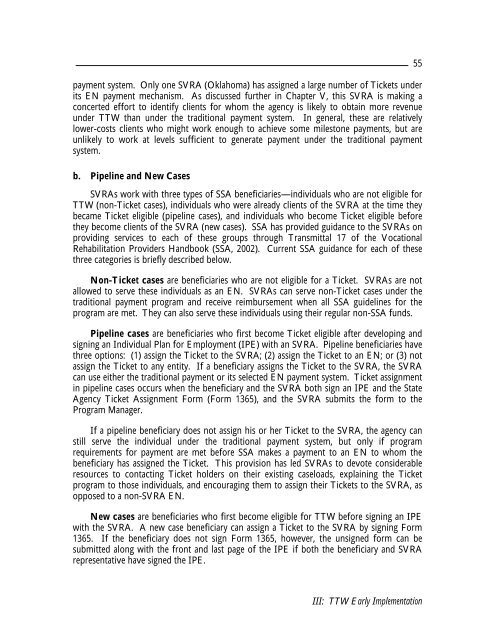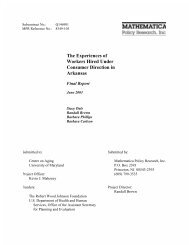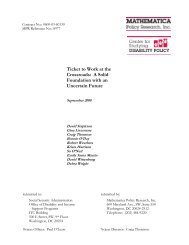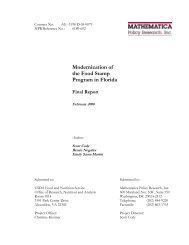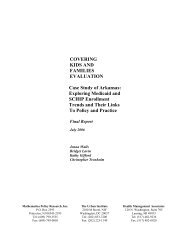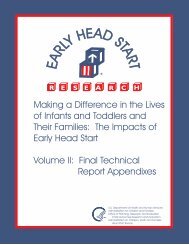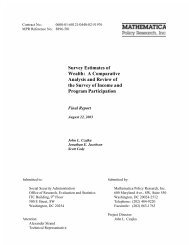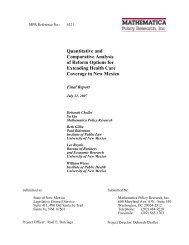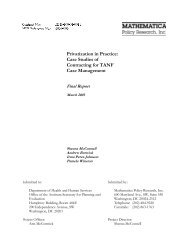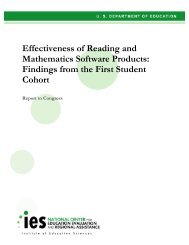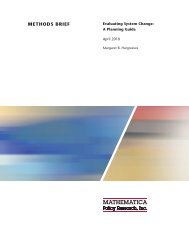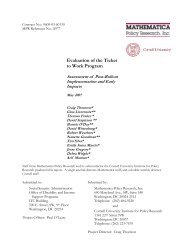Evaluation of the Ticket to Work Program Initial Evaluation Report
Evaluation of the Ticket to Work Program Initial Evaluation Report
Evaluation of the Ticket to Work Program Initial Evaluation Report
You also want an ePaper? Increase the reach of your titles
YUMPU automatically turns print PDFs into web optimized ePapers that Google loves.
payment system. Only one SVRA (Oklahoma) has assigned a large number <strong>of</strong> <strong>Ticket</strong>s under<br />
its EN payment mechanism. As discussed fur<strong>the</strong>r in Chapter V, this SVRA is making a<br />
concerted effort <strong>to</strong> identify clients for whom <strong>the</strong> agency is likely <strong>to</strong> obtain more revenue<br />
under TTW than under <strong>the</strong> traditional payment system. In general, <strong>the</strong>se are relatively<br />
lower-costs clients who might work enough <strong>to</strong> achieve some miles<strong>to</strong>ne payments, but are<br />
unlikely <strong>to</strong> work at levels sufficient <strong>to</strong> generate payment under <strong>the</strong> traditional payment<br />
system.<br />
b. Pipeline and New Cases<br />
SVRAs work with three types <strong>of</strong> SSA beneficiaries—individuals who are not eligible for<br />
TTW (non-<strong>Ticket</strong> cases), individuals who were already clients <strong>of</strong> <strong>the</strong> SVRA at <strong>the</strong> time <strong>the</strong>y<br />
became <strong>Ticket</strong> eligible (pipeline cases), and individuals who become <strong>Ticket</strong> eligible before<br />
<strong>the</strong>y become clients <strong>of</strong> <strong>the</strong> SVRA (new cases). SSA has provided guidance <strong>to</strong> <strong>the</strong> SVRAs on<br />
providing services <strong>to</strong> each <strong>of</strong> <strong>the</strong>se groups through Transmittal 17 <strong>of</strong> <strong>the</strong> Vocational<br />
Rehabilitation Providers Handbook (SSA, 2002). Current SSA guidance for each <strong>of</strong> <strong>the</strong>se<br />
three categories is briefly described below.<br />
Non-<strong>Ticket</strong> cases are beneficiaries who are not eligible for a <strong>Ticket</strong>. SVRAs are not<br />
allowed <strong>to</strong> serve <strong>the</strong>se individuals as an EN. SVRAs can serve non-<strong>Ticket</strong> cases under <strong>the</strong><br />
traditional payment program and receive reimbursement when all SSA guidelines for <strong>the</strong><br />
program are met. They can also serve <strong>the</strong>se individuals using <strong>the</strong>ir regular non-SSA funds.<br />
Pipeline cases are beneficiaries who first become <strong>Ticket</strong> eligible after developing and<br />
signing an Individual Plan for Employment (IPE) with an SVRA. Pipeline beneficiaries have<br />
three options: (1) assign <strong>the</strong> <strong>Ticket</strong> <strong>to</strong> <strong>the</strong> SVRA; (2) assign <strong>the</strong> <strong>Ticket</strong> <strong>to</strong> an EN; or (3) not<br />
assign <strong>the</strong> <strong>Ticket</strong> <strong>to</strong> any entity. If a beneficiary assigns <strong>the</strong> <strong>Ticket</strong> <strong>to</strong> <strong>the</strong> SVRA, <strong>the</strong> SVRA<br />
can use ei<strong>the</strong>r <strong>the</strong> traditional payment or its selected EN payment system. <strong>Ticket</strong> assignment<br />
in pipeline cases occurs when <strong>the</strong> beneficiary and <strong>the</strong> SVRA both sign an IPE and <strong>the</strong> State<br />
Agency <strong>Ticket</strong> Assignment Form (Form 1365), and <strong>the</strong> SVRA submits <strong>the</strong> form <strong>to</strong> <strong>the</strong><br />
<strong>Program</strong> Manager.<br />
If a pipeline beneficiary does not assign his or her <strong>Ticket</strong> <strong>to</strong> <strong>the</strong> SVRA, <strong>the</strong> agency can<br />
still serve <strong>the</strong> individual under <strong>the</strong> traditional payment system, but only if program<br />
requirements for payment are met before SSA makes a payment <strong>to</strong> an EN <strong>to</strong> whom <strong>the</strong><br />
beneficiary has assigned <strong>the</strong> <strong>Ticket</strong>. This provision has led SVRAs <strong>to</strong> devote considerable<br />
resources <strong>to</strong> contacting <strong>Ticket</strong> holders on <strong>the</strong>ir existing caseloads, explaining <strong>the</strong> <strong>Ticket</strong><br />
program <strong>to</strong> those individuals, and encouraging <strong>the</strong>m <strong>to</strong> assign <strong>the</strong>ir <strong>Ticket</strong>s <strong>to</strong> <strong>the</strong> SVRA, as<br />
opposed <strong>to</strong> a non-SVRA EN.<br />
New cases are beneficiaries who first become eligible for TTW before signing an IPE<br />
with <strong>the</strong> SVRA. A new case beneficiary can assign a <strong>Ticket</strong> <strong>to</strong> <strong>the</strong> SVRA by signing Form<br />
1365. If <strong>the</strong> beneficiary does not sign Form 1365, however, <strong>the</strong> unsigned form can be<br />
submitted along with <strong>the</strong> front and last page <strong>of</strong> <strong>the</strong> IPE if both <strong>the</strong> beneficiary and SVRA<br />
representative have signed <strong>the</strong> IPE.<br />
55<br />
III: TTW Early Implementation


